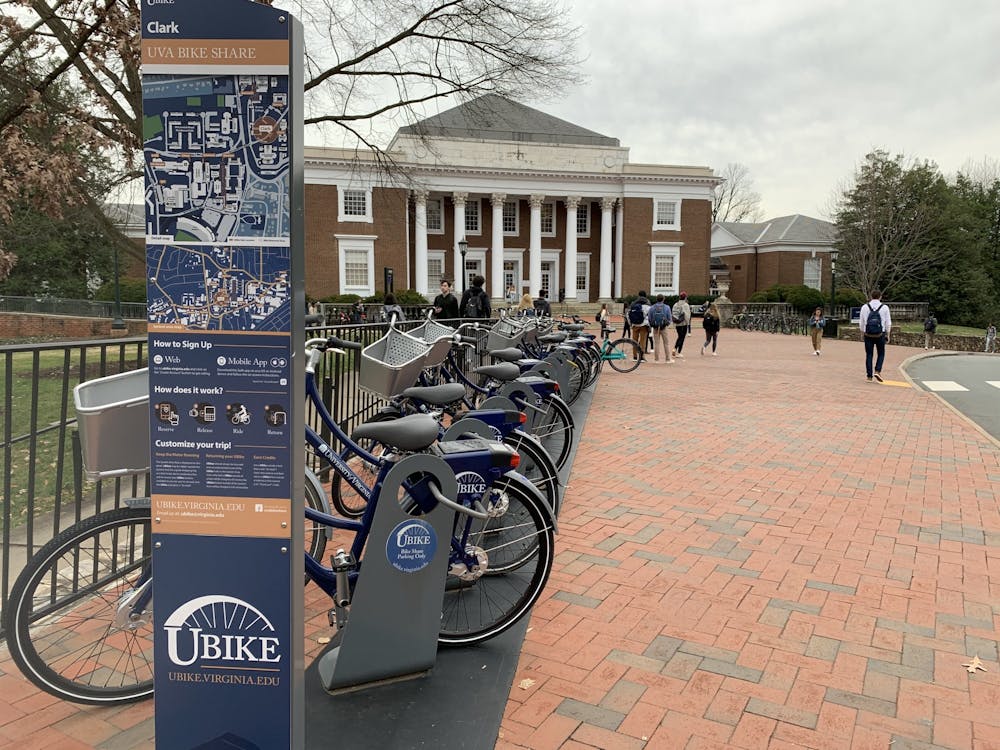The University is preparing to end its bike share service in May as usage has declined about 50 percent since the introduction of electric scooters to Charlottesville last year. UBike was launched in 2015 to allow students, faculty and community members to rent bicycles for transportation on and around Grounds without having to own a bike.
Rebecca White, director of University Parking and Transportation — which operates the UBike system — said the decision to cease operations was driven in part by the city’s dockless mobility program, which “proved to be highly utilized and available regionally to include Grounds.”
Under this program, e-scooter vendors Lime, Bird and VeoRide were allowed to operate in the city and on Grounds for over a year. Since the scooters’ debut, the city estimates that 30,000 users have made more than 200,000 scooter rides for a total of 200,000 miles. Currently, VeoRide is the only e-scooter company remaining in the city, and introduced 150 electric scooters and 50 electric bicycles to the city in November. Lime announced in late December that it will be ceasing operations in Charlottesville after city councilors passed long-term regulations on the scooters. Bird removed its scooters from the city this past summer.
“Utilization of the UBike system peaked in 2018 — the year before the city’s e-scooter pilot — with about 50 trips taken on the system per day,” White said. “Since the e-scooter pilot program started in December 2018, UBike utilization has declined about 50 percent while the e-scooter program has generated about 10 times more rides per day than UBike.”
Like their e-scooter rivals, UBikes can be ridden anywhere on or off Grounds but they need to be returned to a designated hub or the user will be charged an additional fee. As of Jan. 12, there are 62 UBikes available in 17 locations around Grounds, including outside Clark Hall, Newcomb Hall and the Aquatic & Fitness Center.
In addition to growing competition from e-scooters, the University’s provider of the UBike lock mechanism and software was not interested in renewing the procurement beyond May — further leading the University to cease operation of its bike sharing program.
The initial concept for the University’s bike share was developed by students in the McIntire School of Commerce. The UBike program was launched in 2015, partially funded by Virginia Department of Transportation Enhancement grants, as a sustainable alternative to riding the bus or driving single occupant vehicles.
The carbon offset for 2019 UBike usage was 3,512 pounds — a number calculated using software built in to the bikes — compared to 7,518 pounds of carbon offset in 2018. These calculations assume that all the trips taken on UBikes would have otherwise been car trips, which White said could make the data a little inflated.
Phoebe Crisman, associate professor of architecture, director of the Global Studies program and co-chair on the University’s Committee on Sustainability, said that encouraging more people to walk and bike around Grounds is a major priority of the University’s current and new 2020-2030 sustainability plan, which calls on the University to achieve carbon neutrality by 2030 and be fossil fuel free by 2050.
“I’m so sad to hear of the [UBike] change, but I’m certain it doesn’t reflect a decreasing commitment to sustainable transportation on Grounds,” Crisman said. “Unfortunately, convincing more people to use UBikes has been a challenge from the start.”
Crisman said that having a more adequate biking infrastructure at the University could help encourage the people who currently don’t due to safety concerns. Many students in her fall Global Sustainability course explained that they don’t cycle because biking requires too much physical effort on Charlottesville’s often hilly roads, combined with a lack of bike culture at the University and “concern for personal safety due to the lack of continuous, well-designed bike lanes.”
“When I arrived in Charlottesville in 2000, I was shocked by how few people were riding bicycles compared to other cities where I’d lived,” Crisman said. “Since then I’ve traveled around Charlottesville every day on a bicycle, but for many new cyclists the lack of adequate bicycle infrastructure is daunting.”
Once the University’s bike sharing system is removed in May, students, faculty and community members interested in biking around Grounds will have the option to use VeoRide’s electric bicycles, which cost $1.00 to unlock and 15 cents per minute of use.
White said the University’s Department of Parking and Transportation will be holding a tabling event at Newcomb Hall on Wednesday from 10 a.m. to 2 p.m. to inform students about the e-scooters and e-bikes deployed by VeoRide to promote green modes of transportation.
“The University is committed to providing transportation options and we believe the micro and dockless-mobility program that is emerging in the city will continue to serve that need on Grounds,” White said.





